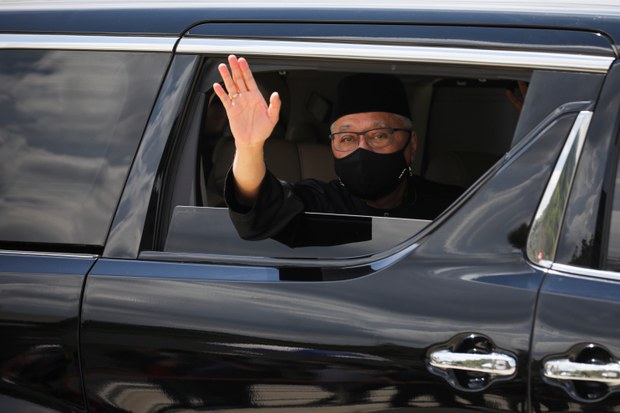Malaysian PM to Meet Thai Counterpart in Bangkok to Discuss Border Reopening
2022.02.23
Kuala Lumpur and Pattani, Thailand
 Ismail Sabri Yaakob waves from a car as he leaves after being inaugurated as Malaysia’s new prime minister, in Kuala Lumpur, Aug. 21, 2021.
Ismail Sabri Yaakob waves from a car as he leaves after being inaugurated as Malaysia’s new prime minister, in Kuala Lumpur, Aug. 21, 2021.
Ismail Sabri Yakob is set to undertake his first official visit to Thailand as Malaysia’s prime minister on Thursday and meet with his Thai counterpart to discuss bilateral cooperation, vaccines, and the reopening of the countries’ shared border, officials said.
The borderlands along Thailand’s far-southern frontier with Malaysia are home to a long-running separatist insurgency, and Thai officials are expected to also raise the issue of recent rebel attacks during the Malaysian PM’s visit, scheduled from Thursday till Saturday. Malaysia has been brokering peace talks between Thailand and the Malay-Muslim rebels.
“During his visit, Prime Minister of Malaysia will have a bilateral meeting with … Prayuth Chan-o-cha, prime minister of Thailand, at Government House on 25 February 2022,” according to a statement from the Thai Ministry of Foreign Affairs.
The meeting will provide an opportunity for the two leaders to discuss strengthening cooperation between Malaysia and Thailand, the Malaysian foreign office said in its own statement.
“Focus areas include economic cooperation, post-COVID-19 cooperation, reopening of borders, and key connectivity projects crossing the land borders,” it added.
Ismail Sabri, who was appointed as PM by Malaysia’s king last August, will also be meeting Malaysians in Thailand during his visit.
Thailand is the fifth neighboring country that Ismail Sabri will visit as prime minister. Since the end of last year, Ismail has visited Indonesia, Singapore and Brunei, and is now in Cambodia on a two-day visit.
In Phnom Penh, Ismail Sabri was scheduled to hold meetings with Cambodian Prime Minister Hun Sen, who is the current chair of the Association of Southeast Asian Nations (ASEAN).
Peace talks resuming next month
During Ismail Sabri’s visit, Thailand plans to bring up with his delegation alleged insurgent attacks on soft targets in the Deep South, a top Thai official said.
Gen. Wanlop Rugsanaoh, the chief of Thailand’s negotiating team in the Malaysia-brokered peace talks, visited the Deep South on Monday to engage with the residents and the military and to gather information about the violence to share with Malaysian delegates.
“I came here to talk with regional commander for close coordination, especially with residents and others who suggested ways to reduce violence on children and women, in particular, as well as in public places and economic districts,” he told reporters in Pattani on Monday.
“This will be for the purpose of addressing the matter during … the visit of Malaysian prime minister.”
Meanwhile, the next round of peace talks is set to be held in March, sources within the main insurgent group Barisan Nasional Revolusi, security officials and Rahim Noor – the Malaysian facilitator of the peace talks – confirmed to BenarNews.
Violence related to the insurgency has gone unabated since the two sides resumed in-person talks in the Kuala Lumpur area in January, when they discussed a reduction in bloodshed as a basis for further negotiations.
Wanlop, however, said the violence would not affect the peace talks, although he did not confirm or deny that the next round of talks would be held next month.
Che Mohd Aziz Yaacob, a regional expert, said the proposed March meeting reflected the sincerity of both sides in solving the issue.
“Yes, this is a good move for peace talks because both sides showed their sincerity and are working hard to speed up the discussion so that the violence and other issues related to the conflict can be solved quickly,” said Yaacob, an associate professor at the School of International Studies in the University Utara Malaysia.
The armed separatist movement against Buddhist-majority Thailand began in the 1960s, primarily demanding independence for the far-southern border region, which is home to predominantly Muslim-Malay people along the Malaysia border. Thailand had annexed it in 1909 as part of a treaty with Britain.
More than 7,000 people have been killed and 13,500 others injured in violence across the region since the insurgency reignited in January 2004, according to Deep South Watch, a local think-tank.







